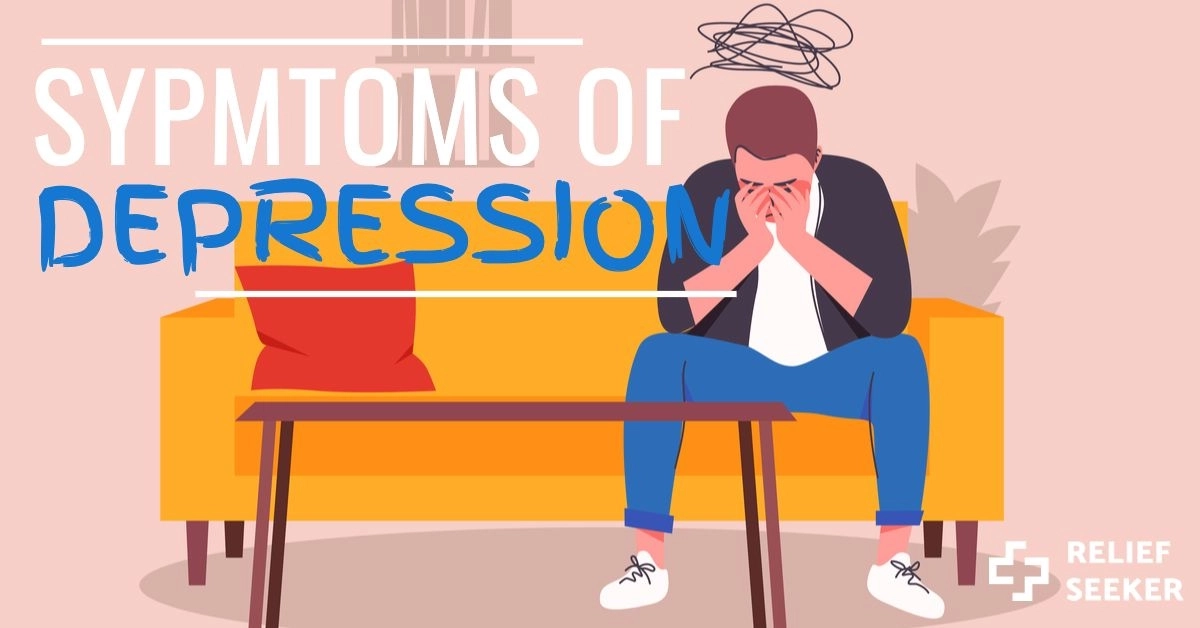264 million people across the globe suffer from depression. This mental health illness was already becoming a major chronic condition for many of us. After COVID-19 hit in early 2020, depression amongst adults and adolescents skyrocketed.
Discover the symptoms of depression and the types of treatment available for people suffering from mild-to-severe depression.
Is It Depression or Something Else?
Did you know that it takes nearly 11 years on average for someone to seek help for depression?
Oftentimes when people are depressed, they don’t even realize it themselves. Our society often tells us that it’s normal to feel depressed or that we should ‘buck up’ and stuff our feelings aside.
Yet it’s important to listen to our feelings and emotions; otherwise, they end up running the show. Ignoring the symptoms of depression can lead to higher levels of depression and even more symptoms.
Types of Depression
There are more than a dozen types of depression. You could suffer from depression because of a chemical imbalance, underlying conditions, or even situational reasons. The most common types of depression include:
- Bipolar disorder
- Major depression
- Peripartum (postpartum) depression
- Persistent depressive disorder
- Premenstrual dysphoric disorder (PMDD)
- Psychotic depression
- Seasonal affective disorder (SAD)
- Situational depression
It’s common for people to suffer from one type of depression or even a combination of several types of depression. Untreated postpartum depression can lead to major depression if left untreated. Situational depression (depressive episodes after a life change, death of a loved one, or another stimulus) can lead to more serious depression conditions.
Causes of Depression
Researchers don’t know the cause of every type of depression, though we do understand some causes.
Most depression is caused by biological or psychological reasons. Chemical imbalances in the brain can lead to depressive episodes, just as situational stressors can lead to poor habits or behaviors.
Some of the most common causes of depression include:
- Seasonal changes
- Major biological changes (surgeries, childbirth, illness, or accidents)
- Life changes (moving, death of a loved one, divorce, bullying, abuse, etc.)
- Genetics
Doctors treat the biological and psychological causes of depression differently. Many doctors will prescribe medications for depression caused by chemical imbalances and talk therapy for situational depression. Yet some doctors may prescribe both medication and talk therapy for depression — regardless of the cause.
Symptoms of Depression
The symptoms of depression are often difficult to diagnose. Depression may manifest itself differently in each person. Some patients suffer from extreme symptoms (such as thoughts of suicide, agoraphobia, or manic episodes), while others may experience more subtle symptoms.
Breaking social engagements, insomnia, and irritability can all be symptoms of underlying depression.
While you may want to note your symptoms, self-diagnosis isn’t recommended, as it’s easy to misdiagnose your symptoms.
Loss of Interest in Activities
One of the most common symptoms of depression is a loss of interest in activities you once enjoyed.
If you suddenly don’t have the energy to play with your kids, participate in hobbies (like reading, cooking, sports, or gardening), or find yourself making excuses to miss work, you may be suffering from depression.
Most people don’t realize they’re depressed until after experiencing symptoms for weeks, months, or even years. This is one of the reasons why diagnosing depression can be so difficult.
It’s common for our interest in activities to differ over the course of our lives. Yet, losing interest in these activities can also be a sign of mental illness.
If you suddenly stop being interested in your book club, you may not need to call your doctor just yet. But if you find yourself losing interest in more than one of the activities used to bring you joy, you may want to chat with a mental health professional.
Difficulty Concentrating
One of the most common symptoms of depression is difficulty concentrating. This symptom can confuse some patients because a growing number of people suffer from attention disorders that aren’t affected by depression.
Yet if you find yourself unable to concentrate, you don’t have a medical history of attention deficit disorders, or you’re experiencing other symptoms of depression, you may want to reach out to a mental health professional.
Feelings of Worthlessness
Another common symptom of depression is feelings of worthlessness. Thoughts associated with this symptom may include feeling:
- You don’t deserve your friends
- The world would be better off without you
- No one likes you
- You don’t have anything to offer society or your community
- You’re letting others down
Again, it’s common for us to question our existence from time to time. Yet when these thoughts become thought patterns, we may want to consider that there are underlying health issues at play.
No one deserves to feel as though they are a burden on society or that they don’t have any value.
Anxiety/Irritability
Not everyone experiences high levels of anxiety and irritability when they’re depressed. But if you’re suddenly feeling on edge more or as though you don’t have the time or patience for people or situations, you may want to chat with your doctor.
While anxiety and irritability may be symptoms of depression, not all annoyances are a sign you’re depressed.
It’s normal to feel frustrated or irritable with people and situations. Yet when you find yourself annoyed with others all the time, you may want to ask yourself if the common denominator in all these issues is you.
Lack of Energy/Sleep Problems
People suffering from depression often find they don’t have the energy to participate in activities they once loved (similar to the ‘loss of interest’ symptom).
Conversely, they often also find they’re tired or lack energy during the day yet can’t sleep at night.
Part of the connection between depression and sleep issues is that both can be cyclical. If you can’t sleep at night, you’re more likely to suffer from depression. Yet anxiety and stress can also lead to sleepless nights.
If you’re struggling to stay awake during the day but can’t seem to get a good night’s sleep, you may want to call your doctor or consider consulting the Diagnostic and Statistical Manual of Mental Disorders (DSM–5) to see if you’re suffering from any other symptoms.
Weight Gain/Weight Loss
When we’re depressed, we’re often not concentrating on what goes into our bodies.
Many patients suffering from depression find they don’t have the energy or desire to move their bodies for the recommended 30 minutes a day. On the other side of depression, many patients find that they don’t have the energy or desire to eat enough nutrients throughout the day.
Researchers don’t really understand the link between depression and weight gain or loss — or why some people lose weight when they’re depressed while others gain it.
One link between weight loss and depression could be that our bodies shut down our digestive system during fight-or-flight responses. When we’re suffering from high anxiety and stress levels, our bodies may not send us hunger signals.
Social Isolation
When we stop taking part in activities we love, we often isolate ourselves from our community. It’s common for depressed people to avoid social situations or even to ‘forget’ to make human connection a part of their weekly routines.
Social isolation can be dramatic, or it can be very subtle. If you find yourself isolating yourself or avoiding social situations, you may already realize that you’re suffering from depression.
Yet, if you simply find yourself too busy to hang out with friends or if you’re just feeling a little antisocial, it might be more difficult to determine if you’re depressed or simply in need of a little solitude.
Try to take stock of your feelings and symptoms. If you’re suffering from other symptoms on this list, you may want to consider chatting with a professional.
Suicidal Thoughts
One common symptom of depression is suicidal thoughts or thoughts of harming yourself or others.
This symptom is very normal — though many depressed people don’t talk about these feelings because they’re embarrassed, don’t want to burden others, or feel shameful.
If you’re experiencing suicidal thoughts or thinking about harming yourself or others, call 911 or SAMHSA's National Helpline at 1-800-662-HELP (4357). It’s free and confidential. Professionals are available 24 a day, 365 days a year.
How to Get Help for Depression
Recognizing your symptoms is the first step to getting treatment for depression. So many of us don’t realize we’re depressed until our lives start feeling out of control.
Once you’ve narrowed down your symptoms, you can begin treatment — and it only gets better from there.
Contact an online doctor or online mental healthcare professional to get properly diagnosed. Once your doctor has ruled out other conditions, you can begin psychotherapy, prescription anti-depression medication, or lifestyle changes — or a combination of all three.
Psychotherapy
Most psychologists recommend lifestyle changes and talk therapy to work through feelings of depression.
Talk therapy can help you discover the root of your mental illness and give you the tools you need to work through your issues on a cognitive level. You may also need to change your diet or start exercising, too.
Prescription Medication/Anti-Depressants
If you’re suffering from certain types of depression, are too depressed to make lifestyle changes, or have a chemical imbalance, your doctor may recommend speaking to a psychiatrist to get a prescription for antidepressants.
Both talk therapy and antidepressants are common ways to treat depression. Your doctor may recommend one or both, depending on your health history and symptoms.
If you’re suffering from the symptoms of depression, you shouldn’t wait to seek help. The sooner you treat your symptoms, the less likely they’ll be to lead to chronic illness and other health conditions.


